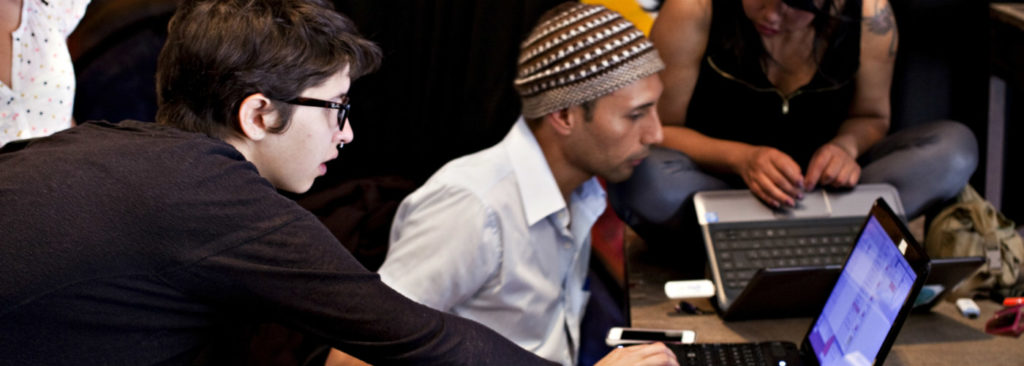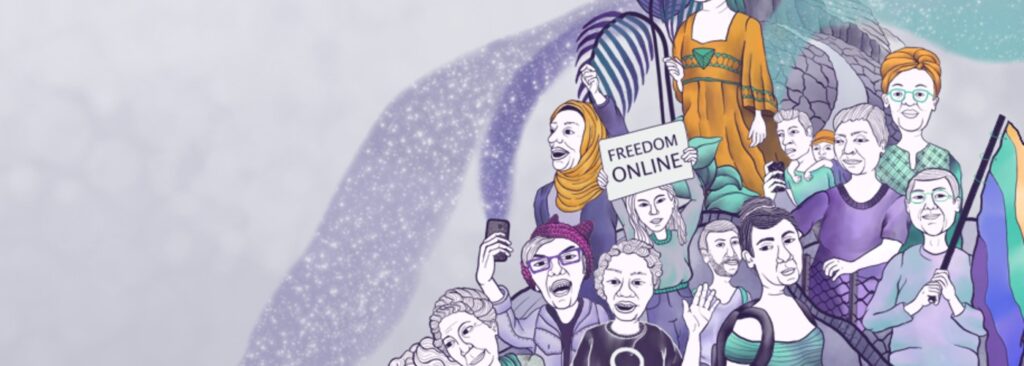Nighat Dad: digital rights activist helping women defend their space online
Nighat Dad was born in the small town of Ratta Matta, in the Punjab province of Pakistan. The conservative, male-dominated society that characterized her upbringing has shaped Nighat into a pioneer for women’s digital rights. Inspired by her feminist and rebellious father, she tirelessly challenges patriarchal structures, which are also deeply rooted in the online world. But as she explains in this interview, her work actually began in the courtroom, when she fought her own case for the custody of her six-month-old son.
What was your life like before establishing the Digital Rights Foundation (DRF)?
“Before DRF I was practicing law. It is not that the concept of digital rights suddenly parachuted itself into my life one day and I thought, ‘Yes! I must do something about it!’ It was a process. It began from my own personal experience… the experience of being violated every day. As a woman, you don’t even realize that you have rights and that your rights are protected by the constitution. We are told that men are the ultimate guardians, the ones who earn money and protect the home. We begin to internalize and accept that women are violated. In my case, my husband was cheating on me. People would tell me that this is just what men do – they cheat. I was told that I wouldn’t be able to survive without a man. So, I took on the challenge, left home, and went through with the divorce.”
In Pakistan, the court system is completely dominated by men, including the majority of lawyers and judges, so the barriers to women gaining access to justice are very tall.
What effect did this experience have on you?
“When I used to go to hearings, I would see women just sitting in the court corridors waiting for their case to be heard. I could see the hopelessness in their eyes – they were just sitting, not knowing what will happen next and not even knowing what the law says. They were entirely dependent on the lawyer, or their father, brother, or whatever male counterpart was accompanying them. Sometimes women are not even allowed to go to court for their own case! This broke my heart, and that’s when I realized how important it is to make women aware of their legal rights.”
After successfully fighting her case in court, Nighat continued working on legal issues around women’s rights and became an integral part of the consultations for drafting new laws. During this time, she had daily access to a computer and the internet in her office. Orkut, the social media platform used in Pakistan at the time, was becoming a popular platform for women to explore the online world. As more women began approaching her with stories of harassment, Nighat’s work began to take a new direction.
When you face online harassment do not leave the space. It is your space and you belong there.
So, how did you enter the world of digital rights?
“Women started reaching out to me to tell me they felt they were being stalked on Orkut and via mobile devices, or that they were receiving unwanted messages or content. Despite telling them it is a form of harassment, they believed it was just part of using the internet or a mobile device. When I discovered there were no legal remedies for this in Pakistan, I asked myself: ‘There are so many activists and women’s organizations working in offline spaces, but what about women’s rights in online spaces?’ So, I studied internet governance for a year and I learned so much; not only about gender and technology and how women can reclaim these spaces, but also about other vulnerable communities that are not recognized in our culture. I then formally started working on digital rights to at least get a discourse started. I wanted to make people realize these are their human rights and these spaces are as important as our offline spaces. This is especially the case for vulnerable communities who don’t have access to many offline spaces: the online world is very precious for them.”
Is that why you decided to establish the Digital Rights Foundation (DRF)?
“I wanted to create a platform that addresses the issues of digital rights, internet governance, and online violence against women. The main objective of DRF was not to just establish another NGO, but to really start a movement on digital rights and internet freedom issues. I live in a country where you never know when or why the government will ban something on the internet. Another objective of DRF was to give a platform to women leaders so they can reclaim the leadership space in the internet freedom community as well. These ideas were in my head and I wanted to give life to them.”
The first campaign of DRF, Hamara Internet, was launched in 2014 to provide women and girls with knowledge and tools to protect their online freedom of expression. Hamara Internet was a project funded by Making All Voices Count – a five-year international program co-implemented by Hivos that funded new ideas to amplify the voices of citizens. In 2016, Nighat won the Human Rights Tulip award, an annual prize awarded by the Dutch Ministry of Foreign Affairs. The prize money allowed Nighat to start a cyber harassment helpline. Hivos’ Digital Defenders Partnership (DDP) has supported the helpline since its inception.
Make very informed decisions about your data – once it is out of your device it can land anywhere and it can stay on the cloud forever.
According to Nighat, the most common form of online threat is the nonconsensual use of intimate images by partners or former partners, husbands, fiancées, ex-fiancées, and even by strangers. Intimate images are those exchanged consensually, but also photoshopped images. This sexualized and gendered form of violence is common throughout the world, but in some regions the consequences are greater.
“Pakistan,” she explains, “is a very repressive and conservative culture, and this is the vulnerability that the perpetrator uses. They don’t even need to put the photo online because just sharing it with the girl’s family can pose a greater risk. So many women have been killed in the name of honor because men think they have control over our bodies.”
She adds, “Also for women human rights defenders, activists, feminists, outspoken women, those who are challenging patriarchy, and women like me who are living in Pakistan on their own terms, this sexualized nature of violence discredits their work, and the public stops listening to them because they think they are women of bad character. There is the common perception that these women are ruining Islamic culture and Pakistan’s image. These forms of threats and violence simply invalidate what they are trying to do to make change in society.”
You mention that you live on your own terms, while at the same time it is clear that DRF supports many women across Pakistan. So, how do you balance being a strong feminist while also appealing to a mass of women in such a conservative society?
“It is difficult but you also need to be contextual. When I go to Baluchistan, I cover my head, respect their culture, and say things in a way that does not disrespect them or their culture. At the same time, I talk about freedom, about the country’s constitution, and about the legal framework. I also talk about what Islam says. Many people say Islam is an oppressive religion for women, but it’s not. It gives equal rights to women; it’s the people, mostly the men, who have interpreted the religion the way they want to. I say this all the time at international conferences: you cannot make a digital security guidebook about what you think about the global south and then send this material to us and say this is for you. No. You need to see what context and culture we live in and how the progressive and liberal principles can also be contextualized. It’s hard, but I feel that the change is coming.”
Through a DDP grant, the helpline is able to stay open seven days a week and provide support, advice, and help to women and girls facing online threats or harassment.
To learn more about Nighat’s work, watch her latest TED talk:







